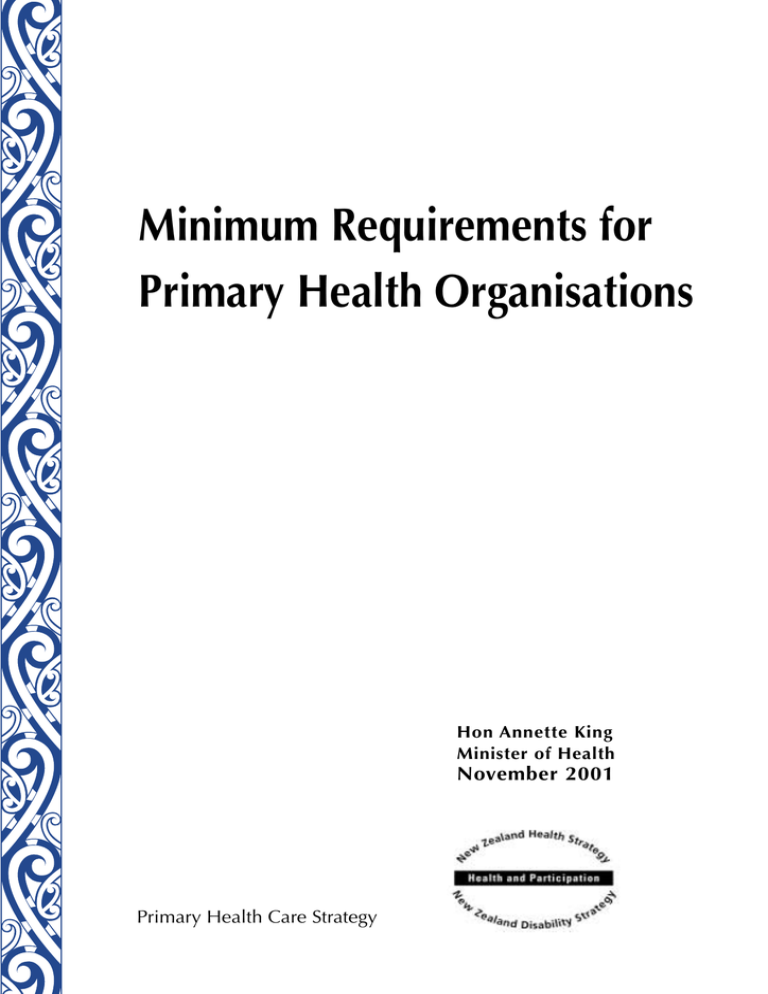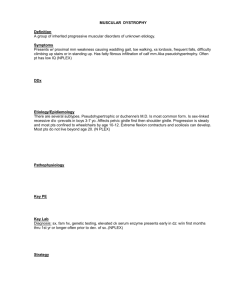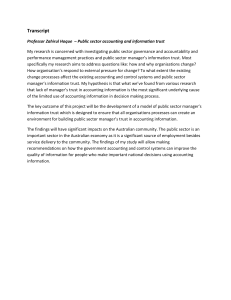Minimum Requirements for Primary Health Organisations
advertisement

Minimum Requirements for Primary Health Organisations Hon Annette King Minister of Health November 2001 Primary Health Care Strategy I am very pleased to release this set of minimum requirements for Primary Health Organisations (PHOs). These requirements are important for getting started on the Primary Health Care Strategy that I released in February this year. District Health Boards, communities and primary health care providers have been eagerly awaiting this information to help them plan for the future. Providers and communities must be able to move at their own pace. Some are close to being PHOs already, others have further to go. They need to be able to find the best local arrangements to achieve the Strategy’s vision and their key relationship will be with the District Health Board. The requirements deliberately leave room for such a variety of approaches. I expect to be able to make some announcements fairly soon about how Government plans to fund the Strategy so that people can get the services they need to improve, maintain and restore their health. Of particular concern and urgency are those highneed groups that have been missing out and they will be the first to move. The Ministry of Health has an extensive work programme to provide District Health Boards with the support, guidance and essential building blocks for getting the Strategy going. The Ministry will shortly be releasing a companion set of guidelines to accompany these minimum requirements. The guidelines will contain tools and ideas so that groups can learn from what has gone before and consider a range of possible choices. I am confident that effective PHOs will grow from and build on the existing strengths of general practitioners, nurses, community and other health workers. Mäori providers, Pacific providers, Independent Practice Associations and other organisations can all evolve into PHOs. They will not be an extra layer of bureaucracy. I look forward with great interest to seeing PHOs develop up and down the country over the next few years. Hon Annette King Minister of Health Minimum Requirements for Primary Health Organisations INTRODUCTION Implementing the Primary Health Care Strategy is a key first step towards achieving the goals set out in the New Zealand Health Strategy. The Primary Health Care Strategy aims to improve health and reduce health inequalities by moving to a system where services are co-ordinated around the needs of a defined group of people. Primary Health Organisations (PHOs) will be organisations of providers working with their communities to achieve this. The process for fully implementing the Strategy is to be an evolutionary one over the next few years building on the strengths of the existing services provided by general practitioners, nurses, community health workers and others. Many of these practitioners operate under existing organisational arrangements such as IPAs, Maori Provider Organisations, rural trusts and so on. Implementing the Strategy means that DHBs will work with these organisations and their communities in order to find the best way locally to set up Primary Health Organisations. KEY POINTS ABOUT PHOs The Strategy (page 5) notes key points about PHOs as follows. Primary Health Organisations will be funded by District Health Boards for the provision of a set of essential primary health care services to those people who are enrolled. At a minimum, these services will include approaches directed towards improving and maintaining the health of the population, as well as first-line services to restore people’s health when they are unwell. Primary Health Organisations will be required to involve their communities in their governing processes. They must also show that they are responsive to communities’ priorities and needs. Primary Health Organisations must demonstrate that all their providers and practitioners can influence the organisation’s decision-making, rather than one group being dominant. Primary Health Organisations will be not-forprofit bodies and will be required to be fully and openly accountable for all public funds that they receive. While primary health care practitioners will be encouraged to join Primary Health Organisations, membership will be voluntary. MINIMUM REQUIREMENTS The main focus is on achieving results in terms of better health, reduced health inequalities and easier access to services. The following minimum requirements set the parameters within which DHBs and local groups will find their own best answers. DHBs will decide whether an organisation is meeting the minimum requirements both in terms of services delivered and its overall structure and governance before allowing it to become a Primary Health Organisation. A set of national guidelines will be distributed to assist DHBs, primary providers and their communities with tools and ideas for PHO establishment and meeting minimum requirements. The process of establishing a PHO will reflect the principles of the Treaty of Waitangi – partnership, participation and protection. WHAT A PHO WILL DO PHOs will aim to improve and maintain the health of their populations and restore people’s health when they are unwell. They will provide at least a minimum set of essential population-based and personal first-line services. DHBs are required, under national service coverage specifications, to ensure people have access to a set of primary health care services. The service agreements they enter with PHOs will specify these services in more detail. The agreements will include associated requirements such as understanding their population, information systems, coordination, and management of referred services within a budget. They will set out expectations about availability, affordability, quality, and cultural competence. For example, PHOs which include rural communities will need to ensure equitable and effective access to primary health care services within their rural communities or within acceptable travel times. PHOs will be required to work with those groups in their populations (for example, Maori, Pacific and lower income groups) that have poor health or are missing out on services to address their needs. The DHB must be satisfied that the PHO’s planning, prioritisation and service delivery will contribute to a reduction in health inequalities. PHOs must demonstrate that they are working with other providers within their regions to ensure that services are co-ordinated around the needs of their enrolled populations. The DHB must be satisfied that PHOs demonstrate they are working with other providers as appropriate to co-ordinate care for their enrolled populations in ways that best meet the needs of their communities. KEY CONSIDERATIONS WHEN ESTABLISHING A PHO DHBs will use a national formula to fund PHOs according to their enrolled populations A formula is being developed nationally so that funding will reflect characteristics of the population that determine their need for primary health care services. The formula will cover the minimum essential services – DHBs may choose to enter other arrangements for other services. PHOs will use a national enrolment system to enrol people through primary providers People will only be able to enrol with one PHO at any time. They will usually enrol at the level of the general practice or primary health clinic. A nationally agreed set of rules will set out people’s and providers’ rights and responsibilities and will establish requirements for information collection and protection. PHOs must demonstrate that their communities, iwi and consumers are involved in their governing processes and that the PHO is responsive to its community The DHB must be satisfied that community participation in PHO governance is genuine and gives the communities a meaningful voice. In addition, DHBs will require PHOs to show how they respond to their communities. PHOs must demonstrate how all their providers and practitioners can influence the organisation’s decision-making. The DHB must be satisfied that PHOs seek the views of providers and practitioners and have sufficient processes to ensure that decisions take account of the range of views. PHOs are to be not-for-profit bodies with full and open accountability for the use of public funds and the quality and effectiveness of services. Before an organisation can become a PHO, the DHB will need to be sure that the organisation has a suitable not-for-profit status and that the requirements for reporting and disclosure will allow the DHB and the public to fully understand the use of public funds and the quality and effectiveness of services in order to evaluate the results.







